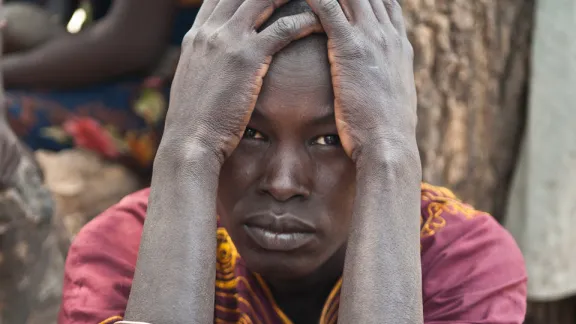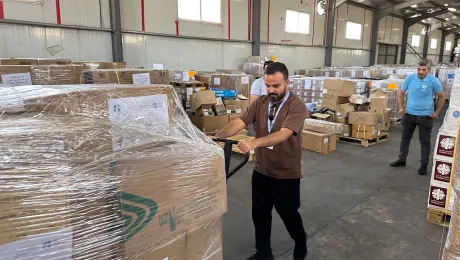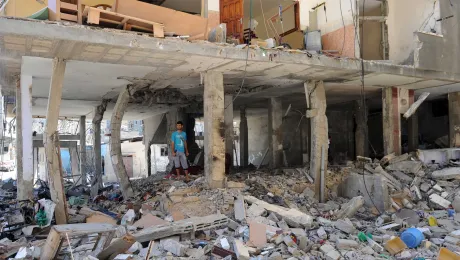
Achol Agol lost her father and brother in a cattle raidersâ attack on her town in Jonglie State, South Sudan. © LWF/Melany Markham
Mental Healthcare in the Wake of Conflict in South Sudan
January the 16th was like most other days in the town of Duk Padiet in Jonglei State, South Sudan. Achol Agol had walked through the heat and dust to the borehole to collect water for her three children, her brother and her father. The family lived together in a small compound close to the center of the town.
She looked up and, some distance away in the southeast, she saw hundreds of men running towards the town–Duk Padiet was under attack by a group of cattle raiders. The raid lasted no more than 20 minutes, but it left her father dead and her three-year-old brother in the hands of the armed raiders.
Agol fled with her other children into the surrounding bush. She stayed there three days until she had the courage to return to the town. When she did, she discovered her father’s body and her brother gone.
“I was very sorrowful and I thought my life had come to an end,” she said.
She misses her brother terribly. “I have so much to tell you. I have lost my father and my brother. Life is going to be terrible,” says Agol.
Agol’s brother is unlikely ever to return to their home. Although child abduction is a common practice during inter-ethnic cattle raids in South Sudan, few children ever make it back home.
Agol’s grief is compounded by the death of her father, who was the family breadwinner. She says that life and death have become the same and she also fears that she will become a target when next a cattle raid occurs.
When talking to Agol, it is easy to see that she is overwhelmed by fear and grief, but she must overcome her feelings so that she can find a way to make a living and support the rest of the family.
With little if anything of an organized social security safety net available in South Sudan, humanitarian aid providers like The Lutheran World Federation (LWF), a founding member of the ACT Alliance, are the only places that people like Agol can turn to for help.
State of Fear
After such traumatic events, aid agencies provide food, water and health care to meet people’s basic needs almost immediately. Treating the trauma–that can be just as debilitating–is a particular challenge.
Justin Mokili Elias works for the LWF as a peace-building officer. He says that the most recent wave of violence is not normal cattle raiding but rather tribal hatred. Other staff from the LWF also say that the attacks around Pibor have been of a scale that is much larger than previous years.
Elias is originally from Central Equatoria State, which has been relatively peaceful since the referendum last year, but he saw the effects of the violence in Jonglei recently when he took part in an assessment in a town called Waat.
Elias said that people have fled to Waat because there is a contingent of 500 soldiers in the town. “They feel safe there,” he notes.
Like others throughout the state, most of the people who sought refuge in Waat had fled in fear of further attacks. It is a common reaction as towns and villages that have not been attacked may well be the next target. This is evident driving south from Agol’s town.
Most of the villages between Duk Padiet and Bor, a distance of some 200 kilometers, are almost completely deserted. In some, goats are still tethered, waiting for the occupants of the village to return and feed them.
Regardless of whether they have fled because of fear of violence or the recent attacks, often one thing they take with them is their trauma.
“There was an urgent need. The people are really traumatized. They live in a state of fear and that requires emotional support,” says Elias. He says that psychosocial support will help them stand on their own, deal with their fear and cope with the challenges they face.
Psychosocial Support
Psychosocial is defined as the close relationship between the psychological and social effects of a disaster or conflict. Emergencies erode the normal community support structures at every level and increase the risks of other problems as well as social injustice and inequality.
According to Else Berglund, psychosocial specialist at ACT Alliance member Church of Sweden (CoS), traumatic experiences can cause painful reactions. People are hyper-vigilant, anticipating the next wave or tremor or explosion, like the people who have fled to Waat. People can also feel helpless or hopeless, or even disoriented, like Agol.
Only during the last decade has mental health been considered part of emergency response. Recognizing this need, the LWF has trained staff like Elias to provide psychosocial support to traumatized communities in South Sudan.
To help those who are suffering emotionally in the wake of the recent cattle raids, two psychosocial specialists from CoS will travel to South Sudan this month to work with LWF staff to offer more in the way of psychosocial support and to help people like Agol get back on their feet. (863 words)
(Written for LWI by Melany Markham in Juba, South Sudan)


